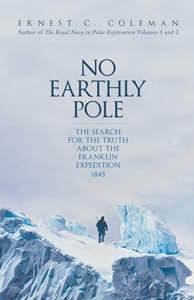New Franklin book seeks to set the record straight
No Earthly Pole, by Ernest C. Coleman
 Ernest C. Coleman has taken part in four expeditions to the Arctic to uncover the fate of the 1845 expedition led by Captain Sir John Franklin that took the lives of 129 men from HMS Erebus and HMS Terror.
Ernest C. Coleman has taken part in four expeditions to the Arctic to uncover the fate of the 1845 expedition led by Captain Sir John Franklin that took the lives of 129 men from HMS Erebus and HMS Terror.
In No Earthly Pole, Coleman is 'determined to set the record straight' as he sees it. Through recounting his own forays into the world’s bitter north, he seeks to highlight the endeavour, determination, labours and pains of men to benefit the rest of humanity by the establishment of a water passage from the Atlantic to the Pacific.
So much has been written about the ill-fated journey Franklin and his crews took to plot the North-West Passage that it has seeped into the popular consciousness. Theirs was a quest that had consumed some of Europe’s most accomplished mariners for almost four centuries. It was an obsession that chipped away at European understanding of North America’s extremities, sometimes at great cost to both vessels and lives.
And although the Franklin expedition was the best-equipped assault on the Passage launched at that time, its two vessels disappeared after sailing north from Baffin Bay. None of the men were ever seen by westerners alive again.
Many theories have been put forward for their demise. Rescue missions turned up tantalising clues: an abandoned sled, personal effects, letters from the crew, and two skeletons. But to this day the fate of Franklin himself remains unknown.
In Coleman’s opinion, some of the theories surrounding this ill-fated expedition have been shaped by political bias – taken over by academics and politicians both for questions of Canadian sovereignty and academic advancement. The author is scathing of these 'closed-minded' philosophies, which he says come at the cost of both Franklin and the Royal Navy’s reputation. 'That they did not succeed was not the fault of poor leadership, incompetence, foolhardiness, vanity or impracticality,' he says. 'Their misfortune was nothing more or less than the unpredictable conditions of environmental adversity.
A Royal Navy man himself, Coleman knows about environmental adversity. The first part of this 350-page hardcover book is dedicated to his explorations of the Canadian Arctic in search of surviving evidence from the 1845 expedition. In it he chronicles the sheer scale of that task in the world’s most extreme climate. There are mishaps and misadventures and the consequences of poor planning and bad judgement. Coleman may be a hardened adventurer in the vein of his hero Franklin, but he is no match for an Arctic summer storm nor immune to starvation.
The second part of the book is an examination of the 'misinformation that carried with it the disparagement and tarnishing of a great enterprise and the sullying of the memory of those who died whilst trying to survive it'. Coleman’s hypotheses might raise a few eyebrows in academic circles – exactly as they are designed to do. With images from his expeditions, including detailed maps and archaeological finds, No Earthly Pole certainly achieves its goal to speak out in opposition to those who have learned their history from textbooks, written by scholars who were in turn tutored by yet more books rather than first-hand experience of adversity. For Coleman, this type of learning has closed minds to the achievements of both Franklin and the Royal Navy in the Arctic. His lived experience could very well open some minds to a revised, more positive narrative of those early explorations and open a path to different types of
studies in future.
No Earthly Pole: The Search for the Truth About the Franklin Expedition 1845
By Ernest C. Coleman
Amberley
ISBN: 978 13981 02118
Buy this book in the Nautilus Bookshop
While you're there, why not browse the rest of the titles in our unique maritime bookshop, which sells all the books reviewed on these pages.
Buy nowMore Books
How to 'make it' in the superyacht industry
Superyacht Success, by Brendan O'ShannassyBack in 2022, we reviewed Brendan O'Shannassy's memoir Superyacht Captain. Now Capt O'Shannassy has returned with a new book that focuses on how crew can navigate their careers.
Love for seafaring conquers all
No Quitting, by Andrea BarkerAndrea Barker's memoir of her 1990s Merchant Navy cadetship tells of her eagerness and determination to follow the career pursued by generations of her family. Unfortunately, there were choppy waters ahead...
Radio revelry
Barques, Sparks and Sharks, by Len WilsonSeafarers are known for their story-telling abilities, and Orkney-born Len Wilson does not disappoint in this memoir of his years as a radio officer
Mastering our harbours
Harbours and Their Masters, by Mark Ashley-MillerNovice skipper Mark Ashley-Miller recently spent five years circumnavigating the UK and Ireland as a charity challenge – interviewing and photographing the harbour masters he met along the way.
